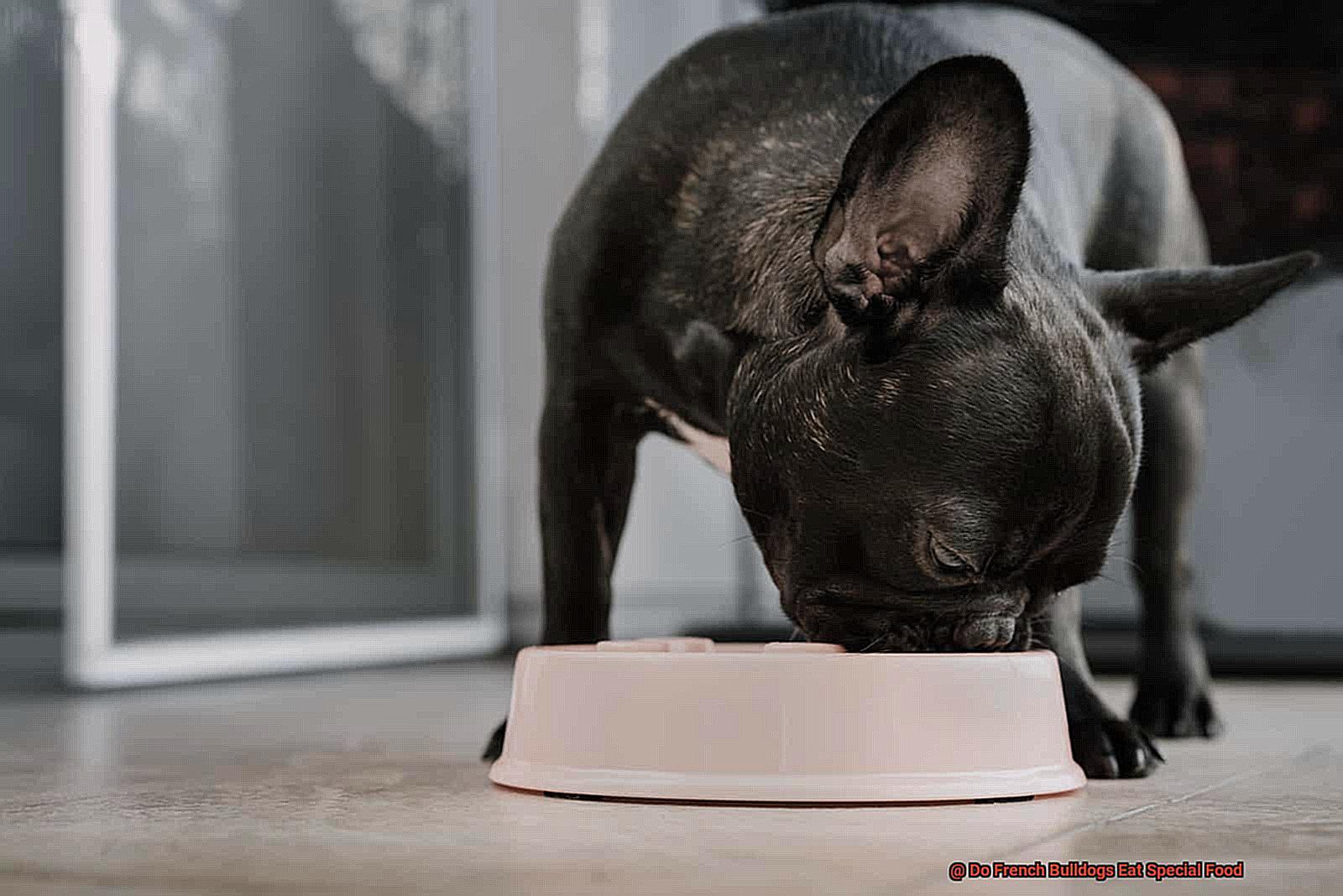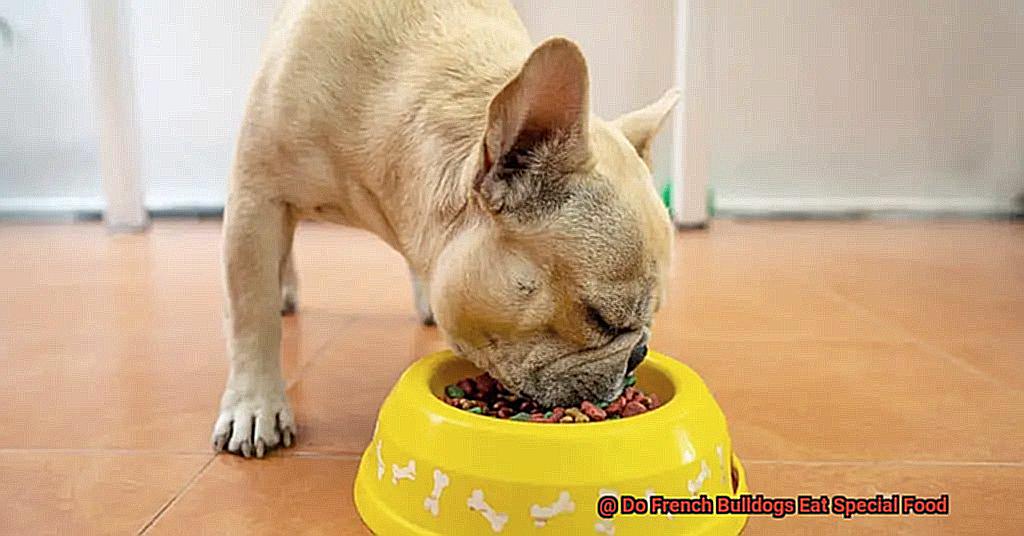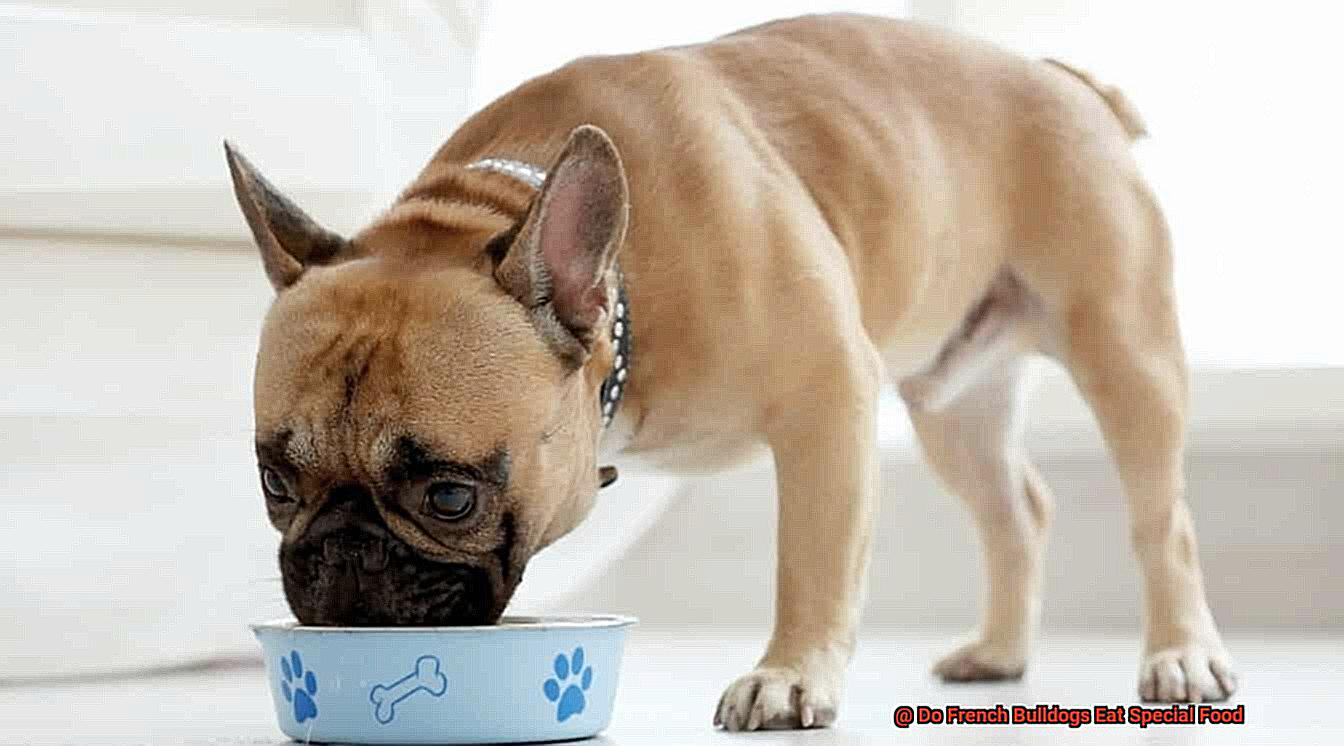Do French Bulldogs Eat Special Food?
French Bulldogs, those lovable companions that steal our hearts with their affectionate nature and oh-so-adorable appearance. But have you ever wondered if these little furballs have any specific dietary needs to keep them happy and healthy? Well, wonder no more.
In this blog post, we’re diving into the world of French Bulldogs’ taste preferences and shedding light on their special food requirements. While they may not be divas when it comes to dining, there are a few things you should know to ensure their wagging tails stay in full swing.
Join us on this culinary journey as we explore the key elements that make French Bulldogs’ food needs somewhat unique. We’ll dish out tips on what types of food can support their overall health and maintain their playful disposition. So get ready to dig in and discover how to keep your Frenchie satisfied.
Stay tuned for our upcoming segments where we’ll take you on a flavorful exploration of balanced nutrition tailored specifically for your French Bulldog’s well-being. Trust us, their taste buds will thank you.
Do French Bulldogs eat special food
Contents
- 1 Do French Bulldogs eat special food
- 2 Choosing the Right Type of Food for French Bulldogs
- 2.1 Introduction:
- 2.2 Weight Management: Keep those curves in check.
- 2.3 Allergies and Sensitivities: No more tummy troubles.
- 2.4 Digestion and Flatulence: Let’s clear the air.
- 2.5 Dental Health: Keep those pearly whites shining.
- 2.6 Age Matters: From puppyhood to senior years.
- 2.7 The Expert’s Touch: Consult your vet.
- 3 The Importance of High-Quality Protein for French Bulldogs
- 4 Special Considerations When Feeding French Bulldogs
- 5 Monitoring Portion Sizes for French Bulldogs
- 6 Healthy Treats for French Bulldogs
- 6.1 Why Healthy Treats Matter
- 6.2 Selecting the Right Treats Opt for small-sized treats with a soft texture to prevent digestive issues. Natural and organic treats are great choices as they are less likely to contain harmful ingredients. Commercially available treats formulated for French Bulldogs cater to their unique dietary needs. Healthy Treat Options
- 6.3 Moderation is Key
- 7 The Benefits of Glucosamine and Chondroitin in Dog Foods
- 8 Common Allergies and Sensitivities in French Bulldogs
- 9 Providing Fresh Water for Your French Bulldog
- 10 Conclusion
French Bulldogs are adorable and lovable companions that bring joy to our lives. As responsible pet owners, it’s crucial to understand their unique dietary needs to ensure their overall health and well-being. In this blog post, we will explore why French Bulldogs may need to eat special food and provide helpful tips on choosing the right diet for them.
Size and Shape Matters
French Bulldogs have a distinct brachycephalic (flat-faced) structure, which affects their ability to chew certain types of food. Their shorter muzzles and smaller teeth make it challenging for them to handle large kibble sizes or hard, crunchy foods.
To avoid any discomfort or choking hazards, consider feeding your French Bulldog smaller-sized kibble or wet food that is easier for them to chew and swallow.
Sensitive Stomachs
French Bulldogs are notorious for having sensitive stomachs and can be prone to digestive issues such as flatulence, diarrhea, and food allergies. To prevent these problems, it’s essential to select a diet that avoids common triggers like grains, certain proteins (beef or chicken), and artificial additives. Look for high-quality dog food specifically formulated for sensitive stomachs or allergies to ensure your furry friend’s tummy stays happy and healthy.
Weight Management Matters
Obesity is a common problem among French Bulldogs, which can lead to serious health conditions. It’s crucial to monitor their calorie intake and provide a balanced diet to maintain a healthy weight. Opt for portion-controlled meals that contain the right balance of nutrients, avoiding excessive amounts of fat or carbohydrates. This will help prevent weight gain and promote a long and active life for your French Bulldog.
Specialized Dog Food Options
Fortunately, there are specialized dog foods available that cater specifically to the unique needs of French Bulldogs. These foods consider their size, jaw structure, digestive sensitivities, and weight management requirements. They often feature easily digestible proteins like fish or turkey, exclude common allergens, and are formulated to support their overall health.
Choosing the Right Type of Food for French Bulldogs
Choosing the Right Type of Food for Your French Bulldog: Keeping Their Tummies Happy and Their Tails Wagging.
Introduction:
Hey there, fellow French Bulldog lovers. We all know that these little bundles of joy are not only cute but also have some unique dietary needs. So, let’s dive into the importance of carefully selecting food for our furry friends and keep their tummies happy and their tails wagging.
Weight Management: Keep those curves in check.
French Bulldogs have a slower metabolism, which means they need fewer calories than other breeds. To prevent them from packing on the pounds, opt for a low-calorie or weight management formula. This will help avoid obesity and the health issues that come with it.
Allergies and Sensitivities: No more tummy troubles.
Frenchies can be prone to allergies and sensitivities, so it’s essential to choose food free from common allergens like wheat, soy, and corn. Look for options with high-quality protein sources like chicken, turkey, or fish. These are less likely to cause adverse reactions and will keep those tummy troubles at bay.
Digestion and Flatulence: Let’s clear the air.
Due to their brachycephalic (short-nosed) structure, French Bulldogs can struggle with digestion and flatulence. Choose a food that contains easily digestible ingredients to alleviate these issues. Adding prebiotics and probiotics to their diet can also promote a healthy gut microbiome and improve digestion. Trust me; you’ll thank me later.
Dental Health: Keep those pearly whites shining.
French Bulldogs often face dental problems due to their small jaws. Dry kibble or dental chews can help maintain oral hygiene by keeping their teeth clean and preventing dental diseases. So, throw them a bone (or a dental chew) and keep those pearly whites shining.
Age Matters: From puppyhood to senior years.
Consider the age of your Frenchie when selecting food. Puppies have different nutritional needs than adult dogs, so choose a food specifically formulated for puppies until they reach adulthood. Senior French Bulldogs may benefit from a diet that supports joint health and includes ingredients like glucosamine and chondroitin.
The Expert’s Touch: Consult your vet.
Remember, your veterinarian is your best friend when it comes to choosing the right food for your French Bulldog. They can provide personalized recommendations based on your pup’s specific needs, such as existing health conditions or dietary restrictions. So, don’t be shy; consult the expert.
The Importance of High-Quality Protein for French Bulldogs
When it comes to keeping our furry friends healthy and happy, one aspect that should never be overlooked is their diet. French Bulldogs, with their unique breed characteristics and active lifestyle, require specific dietary needs to thrive. One crucial element that should be prioritized in their diet is high-quality protein. Let’s dive into why this nutrient is so important for French Bulldogs and how it can benefit their overall health and well-being.
Building Blocks for Growth and Development
Protein is like the superhero of nutrients when it comes to building and repairing tissues. It provides the essential amino acids that our French Bulldogs need for proper growth and development. From strong muscles to healthy skin and coat, protein plays a key role in supporting these vital functions.
Boosting the Immune System
Did you know that protein also plays a crucial role in maintaining a healthy immune system? It helps produce antibodies that fight off infections and diseases, keeping our French Bulldogs strong and resilient. By providing high-quality protein in their diet, we can give them the support they need to stay healthy and active.
Choosing the Right Protein Sources
Not all protein sources are created equal, especially when it comes to our French Bulldogs. To ensure optimal nutrient absorption and digestion, it’s important to choose protein sources that are easily digestible and of high quality. Look for lean meats like chicken, turkey, beef, or fish. Eggs are also an excellent source of protein for our furry friends. For those looking for plant-based options, legumes such as lentils and chickpeas can be a great addition to their diet.
Avoiding Low-Quality Protein
While it’s important to focus on high-quality protein sources, it’s equally crucial to avoid low-quality options. By-products or fillers often provide little nutritional value and can be harder for our French Bulldogs to digest. Opting for premium dog food brands that prioritize real meat sources and avoid artificial additives is the way to go.
Maintaining a Healthy Weight
Obesity is a common issue among French Bulldogs, and high-quality protein can be a valuable tool in managing their weight. Protein promotes the development of lean muscle mass, which not only helps them maintain a healthy weight but also supports their overall strength and mobility.
Finding the Right Balance
As with any nutrient, it’s crucial to find the right balance when it comes to protein intake. Consulting with a veterinarian or a canine nutritionist can help determine the appropriate amount of protein for your French Bulldog based on factors such as their age, weight, and activity level. This way, you can ensure they are getting the right amount of protein to support their unique needs.
Special Considerations When Feeding French Bulldogs
Special Considerations When Feeding French Bulldogs
French Bulldogs are adorable and lovable companions, but they also have some unique dietary considerations. As a proud owner of a French Bulldog myself, I’ve learned a lot about their specific needs when it comes to feeding. In this article, I’ll share some insights and tips to help you provide the best nutrition for your furry friend.
- Mind the Mouth: French Bulldogs have a cute, squished face that gives them their distinctive look. However, this brachycephalic skull shape can make it challenging for them to eat certain foods. To make mealtime easier, opt for smaller, bite-sized pieces of food that are easier for them to chew and swallow. This reduces the risk of choking and improves digestion.
- Sensitive Stomachs: French Bulldogs are known for having sensitive digestive systems. They are prone to food allergies, sensitivities, and digestive disorders. To avoid upset tummies, choose a high-quality dog food specifically formulated for French Bulldogs or for dogs with sensitive stomachs. Look for easily digestible ingredients and avoid common allergens such as grains, dairy, and artificial additives.
- Watch the Waistline: French Bulldogs have a low exercise tolerance and can gain weight easily. Obesity can lead to serious health issues like joint problems and heart disease. To keep your Frenchie fit and healthy, monitor their calorie intake and feed them a balanced diet with appropriate portion sizes. Avoid overfeeding and resist those pleading puppy eyes when they beg for extra treats.
- Age Matters: Just like humans, French Bulldogs have different nutritional needs based on their age and life stage. Puppies require more calories, protein, and nutrients for growth, while adult and senior French Bulldogs may need different levels of certain nutrients to support their overall health. Consult with your veterinarian to determine the best feeding plan for your Frenchie at each stage of their life.
- Tailored to Health Conditions: Some French Bulldogs may have specific dietary restrictions or special needs due to underlying health conditions. For example, dogs with allergies or sensitivities may require a limited ingredient diet or hypoallergenic food. Those with pancreatitis or kidney disease may need a specialized prescription diet. Work closely with your veterinarian to determine the most appropriate diet for your Frenchie’s specific health concerns.
Remember, every French Bulldog is unique, so it’s important to pay attention to their individual needs and consult with a veterinarian if you have any concerns about their diet. By taking these special considerations into account, you can ensure that your French Bulldog receives the best nutrition and support for a long and happy life.
Monitoring Portion Sizes for French Bulldogs
French Bulldogs are adorable little bundles of joy that require special care, including monitoring their portion sizes. As these furry friends are prone to obesity, it is crucial to maintain a healthy weight through proper portion control. In this comprehensive guide, we will explore the importance of monitoring portion sizes for French Bulldogs and provide tips on how to do so effectively.
Understanding the Importance of Portion Control:
French Bulldogs have a small stature and low activity levels, which increases their risk of obesity. Maintaining a healthy weight is vital to prevent health issues such as joint problems and breathing difficulties. By monitoring portion sizes, you can ensure your French Bulldog stays fit and happy.
Consultation with a Veterinarian:
Every French Bulldog is unique, and their portion sizes may vary based on factors like age, weight, activity level, and overall health. To determine the appropriate portion sizes for your specific dog, consult with a veterinarian who can provide personalized recommendations.
Start with Feeding Guidelines:
Dog food manufacturers provide general feeding guidelines on their packaging as a starting point. However, keep in mind that these recommendations may not be suitable for every individual dog. Use them as a reference but be prepared to make adjustments based on your French Bulldog’s needs.

Measuring Portions:
Eyeballing portion sizes can lead to unintentional overfeeding. Use a measuring cup or scale to accurately measure your French Bulldog’s food. This practice prevents overeating and helps maintain a healthy weight.
Split Meals for Better Control:
Rather than feeding one large meal, divide your French Bulldog’s daily food allowance into multiple smaller meals throughout the day. This approach prevents overeating, aids digestion, and stabilizes blood sugar levels.
Treats Matter Too:
Treats are an essential part of training and bonding, but they should be factored into your French Bulldog’s overall daily caloric intake. Choose treats that are appropriately sized and low in calories to avoid excessive weight gain.
Monitor Body Condition Score (BCS):
Regularly assess your French Bulldog’s body condition score (BCS) using a scale of 1-A BCS of 4 or 5 is ideal for most French Bulldogs. If your dog’s BCS indicates overweight or underweight, adjust portion sizes accordingly in consultation with your veterinarian.
Regular Adjustments:
Portion sizes may need periodic adjustments based on changes in weight, activity level, and overall health. Stay in touch with your veterinarian to ensure your French Bulldog’s feeding plan remains appropriate.
Conclusion:
Monitoring portion sizes for French Bulldogs is vital to maintain their overall health and prevent obesity-related issues. By consulting with a veterinarian, accurately measuring portions, splitting meals, selecting suitable treats, and regularly monitoring their body condition score, you can ensure your furry friend stays healthy and happy throughout their life.
Healthy Treats for French Bulldogs
French Bulldogs are known for their adorable appearance and playful personalities. To keep these furry friends happy and healthy, it is important to provide them with treats that meet their dietary needs. In this blog post, we will explore the importance of healthy treats for French Bulldogs and provide expert tips on selecting the best options. So let’s dive in and learn how to keep our Frenchies fit and fabulous.
Why Healthy Treats Matter
- French Bulldogs have specific dietary needs, and their treats should align with those needs.
- Healthy treats contribute to overall well-being and prevent potential health issues.
- Choosing high-quality ingredients, free from additives and artificial flavors, is crucial.
Selecting the Right Treats
- Opt for small-sized treats with a soft texture to prevent digestive issues.
- Natural and organic treats are great choices as they are less likely to contain harmful ingredients.
- Commercially available treats formulated for French Bulldogs cater to their unique dietary needs.
Healthy Treat Options
- Fruits such as apple slices and blueberries provide essential nutrients and add variety to their diet.
- Vegetables like carrots and green beans are low in calories and high in fiber, promoting good digestion.
- Lean proteins such as boiled chicken or turkey can be used as tasty training treats.
Moderation is Key
- Treats should make up no more than 10% of their daily food intake to avoid weight gain.
- Consult your veterinarian for personalized recommendations and to ensure your Frenchie’s specific needs are met.
The Benefits of Glucosamine and Chondroitin in Dog Foods
If you’ve ever wondered about the superpowers behind those dog foods packed with glucosamine and chondroitin, you’re in for a treat. In this article, we’ll unleash the secrets of these magical ingredients and explain why they are crucial for our beloved Frenchies’ joint health. So, grab a cup of coffee, sit back, and let’s dive into the world of happy hips.
The Power Duo: Glucosamine and Chondroitin:
- Glucosamine: This natural compound works wonders when it comes to building and maintaining healthy cartilage in your Frenchie’s joints. It’s like the superhero that keeps their joints strong and flexible.
- Chondroitin: Picture this ingredient as the sidekick to glucosamine. It not only prevents cartilage breakdown but also fights inflammation in those precious little joints. Talk about a dynamic duo.
Why French Bulldogs Need Some Joint TLC:
- Body Structure Woes: Our adorable Frenchies, with their cute stocky legs, unfortunately, have a higher risk of joint problems compared to other breeds.
- Brachycephalic Breeds Unite: As part of the brachycephalic family, our French Bulldogs face additional challenges due to their unique body structure.
- Joint Conditions? No More.: By including glucosamine and chondroitin in your Frenchie’s diet, you can support their joint health and reduce the chances of joint issues like arthritis or hip dysplasia.
Collagen Production for the Win:
- Collagen is Key: These magical ingredients work their charm by promoting collagen production in your furry friend’s body.
- Say Bye-Bye to Brittle Bones: Collagen keeps those joints strong, flexible, and ready for all the zoomies and playdates your Frenchie craves.
Beyond Joint Health: The Added Perks:
- Shiny Coats and Wagging Tails: Glucosamine and chondroitin may also enhance your Frenchie’s skin and coat health. Say goodbye to dry skin and hello to luscious locks.
- Mighty Immune System: These ingredients have been known to lend a helping paw in supporting your Frenchie’s overall immune function. It’s like giving them a little superhero boost.

Common Allergies and Sensitivities in French Bulldogs
French Bulldogs are adorable and playful companions, but like any other breed of dog, they can also have allergies and sensitivities to certain foods. As an expert in French Bulldog care, I want to help you understand the common allergies and sensitivities that your furry friend might face. Let’s dive into some of these issues and how you can address them.
- Grain Allergies: Many French Bulldogs are allergic to grains such as wheat, corn, and soy. These ingredients are commonly found in commercial dog foods and can cause gastrointestinal issues, skin irritations, and even ear infections. If you notice your Frenchie scratching excessively or experiencing digestive problems, it might be worth considering a grain-free diet.
- Poultry Allergies: Some French Bulldogs develop an allergic reaction to poultry, specifically chicken or turkey. Symptoms can include itching, redness, and digestive upset. If you suspect your Frenchie has a poultry allergy, it’s best to avoid feeding them any food containing chicken or turkey.
- Dairy Sensitivities: Just like some humans, many dogs, including French Bulldogs, are lactose intolerant. This means they struggle to digest lactose, the sugar found in milk and other dairy products. If your Frenchie experiences gastrointestinal issues like diarrhea or vomiting after consuming dairy, it’s best to avoid giving them these products.
- Protein Sensitivities: French Bulldogs can also be sensitive to certain proteins like beef or lamb. Similar to allergies, protein sensitivities can cause digestive upset and skin irritations. If you suspect your Frenchie has a protein sensitivity, consider switching to a hypoallergenic dog food that eliminates the problematic protein.
To properly address your French Bulldog’s allergies or sensitivities, keep a food diary to track any patterns or triggers. Make sure to consult with your veterinarian before making any changes to their diet. A vet can provide guidance on the best course of action and recommend appropriate food options tailored to your Frenchie’s specific needs.
Providing Fresh Water for Your French Bulldog
As a French Bulldog owner, you know that these little bundles of joy require special care and attention. One of the most important aspects of their well-being is ensuring they have access to fresh water at all times.
Hydration is crucial for their overall health and can prevent a range of issues, from urinary tract problems to heatstroke. So, let’s dive into the world of hydrating your Frenchie and learn some tips and tricks to keep them properly hydrated.
The Right Bowl for Your Frenchie
When it comes to choosing a water bowl for your French Bulldog, size matters. You want to make sure the bowl is big enough for them to comfortably drink from without their adorable little faces getting soaked.
Stainless steel or ceramic bowls are ideal as they are easy to clean and less likely to harbor bacteria compared to plastic bowls. Plus, they won’t tip over easily during those enthusiastic drinking sessions.
Cleanliness is Key
Just like us, French Bulldogs prefer fresh and clean water. Be sure to wash their water bowl regularly with warm soapy water to prevent any yucky buildup of bacteria. You wouldn’t want to drink from a dirty glass, right? Your Frenchie feels the same way.
Monitoring Their Water Intake
It’s essential to monitor your French Bulldog’s water intake to ensure they are drinking enough. Dehydration can be dangerous and lead to serious health problems. Keep an eye on their behavior and if you notice excessive panting, dry gums, or lethargy, it may indicate dehydration. During hot weather or after a vigorous play session, they may require more water than usual. So, always have a watchful eye on their hydration needs.
Preventing Boredom with a Dog Water Fountain
Some French Bulldogs prefer running water over still water in their bowls. If your Frenchie falls into this category, consider investing in a dog water fountain. Not only will it provide a continuous flow of fresh water, but it will also keep them entertained and hydrated at the same time.
No to Milk or Soda, Yes to Fresh Water
While it might be tempting to give your French Bulldog a taste of your morning latte or a sip of soda, it’s best to stick to providing them with fresh water only. Other liquids like milk, juice, or soda can be harmful to their health and may upset their delicate stomachs. So, save those treats for yourself and keep their hydration options limited to good ol’ H2O.
Conclusion
French Bulldogs have unique dietary needs that require special attention.
It is crucial to provide them with a balanced and nutritious diet to support their overall health and well-being. These adorable pups are prone to certain health issues, such as allergies and sensitivities, which may necessitate specific food choices.
By opting for high-quality dog food formulated specifically for French Bulldogs, you can ensure that they receive the essential nutrients they need without any potential triggers or harmful ingredients. Additionally, feeding them smaller, frequent meals can help prevent digestive issues that are common in this breed.
Remember, taking care of their nutritional needs is an important part of being a responsible French Bulldog owner.




